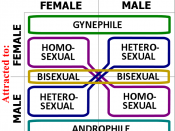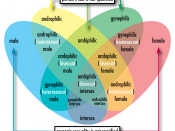AbstractMany studies have shown that homosexual parents can raise healthy, happy and well-adjusted children just as successfully as can heterosexual parents. There are no differences in developmental outcomes between children raised by homosexual parents and those raised by heterosexual parents. There is no evidence that children of lesbian and gay parents are confused about their gender identity, either in childhood or adulthood, or that they are more likely to be homosexual. Furthermore, children raised in same-sex environments show no differences in cognitive abilities, behavior, general emotional development, or such specific areas of emotional development as self-esteem, depression, or anxiety.
Homosexual ParentingIn terms of homosexual parenting, one of the questions that is constantly posed is: how are children raised by homosexual parents affected by being raised in such arelationship? There have been a range of studies conducted into this question whichhave been assessed in a number of review articles such as Patterson (1997), Fitzgerald (1998), Golombok et al (2003), Anderssen et al.
(2002), and the most recently by Brewaey (2003). All of these review articles and the studies they contain conclude that there are no differences in developmental outcomes between children raised by homosexual parents and those raised by heterosexual parents.
First, lesbian mothers and gay fathers are much like other parents. Where differences are found, they sometimes favor same-sex parents. For instance, although one study finds that heterosexual fathers had greater emotional involvement with their children than did lesbian co-mothers, others find either no difference or that lesbian co-mothers seem to be more involved in the lives of their children than are heterosexual fathers (McLanahan, 2005).
Second, there is no evidence that children of lesbian and gay parents are confused about their gender identity, either in childhood or adulthood, or that they are more likely to be homosexual (McLanahan et...


